ffmpeg视频编解码 demo初探(包含下载指定windows版本ffmpeg)分离视频文件中的视频流每一帧YUV图片
Posted Dontla
tags:
篇首语:本文由小常识网(cha138.com)小编为大家整理,主要介绍了ffmpeg视频编解码 demo初探(包含下载指定windows版本ffmpeg)分离视频文件中的视频流每一帧YUV图片相关的知识,希望对你有一定的参考价值。
参考文章2:【FFmpeg编码实战】(1)将YUV420P图片集编码成H264视频文件
文章目录
第一个项目:分离视频文件中的视频流每一张图片
先参考这个文章:【FFmpeg解码实战】(2)分离视频文件中的视频流每一张图片(进阶)(C)
这篇文章的上一篇文章:【FFmpeg解码实战】(1)解码并分离视频文件中的音频流和视频流(C),也是第一篇demp,我们跳过
博主提供了工程下载方式:VS2019-解码视频-工程所有文件.zip
这个下载的项目其实是把解码并分离视频文件中的音频流和视频流和分离视频文件中的视频流每一张图片合在一起了,通过宏开关去控制

弯路
里面没有ffmpeg,我们下载博主编译好的或者直接到官网下载
博主给的:
你要ARM 的话,可以使用这个: https://download.csdn.net/download/Ciellee/13027058
windows 的话,可以用这个 : https://download.csdn.net/download/Ciellee/12915075
都是我之前用最新的 4.3 源码自已编译的
我没有用博主的,直接找方法自己编译了一个,不过是4.4版本的,不知道兼容不兼容
Visual Studio 2019 VS编译ffmpeg4.4为静态库或动态库
然后我们在博主的工程里面,添加include和lib两个目录,并且把需要的头文件和库文件拷贝进去
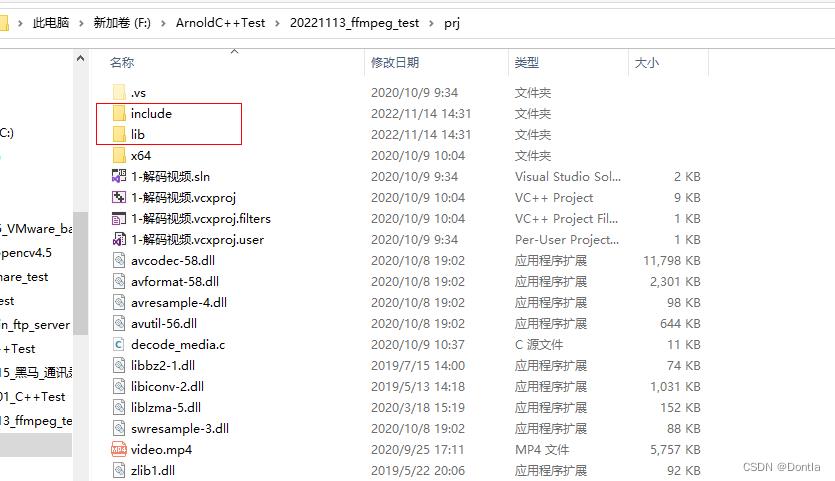


在vs项目种配置附加包含目录和附加库目录
看vs项目的这个地方发现博主是这样包含ffmpeg的头文件和库目录的,我们把它改了
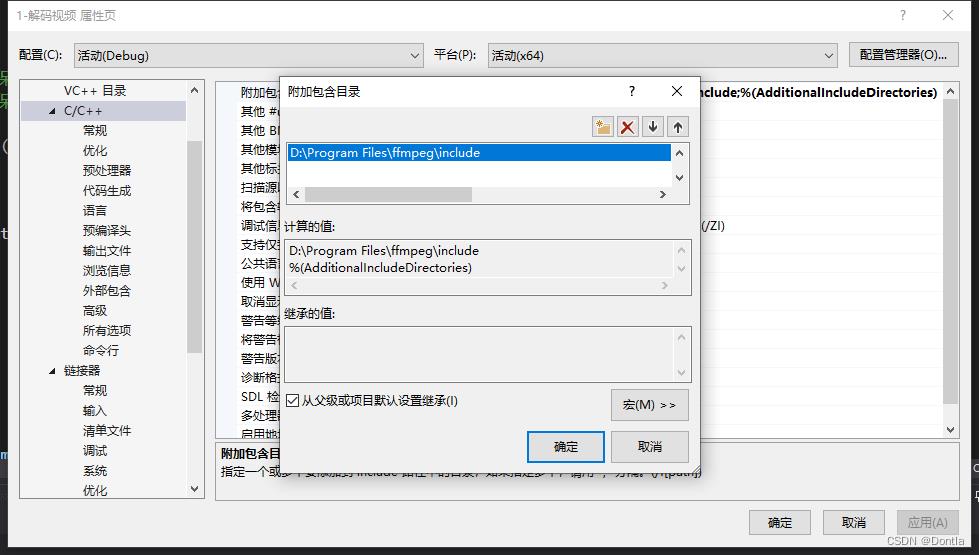
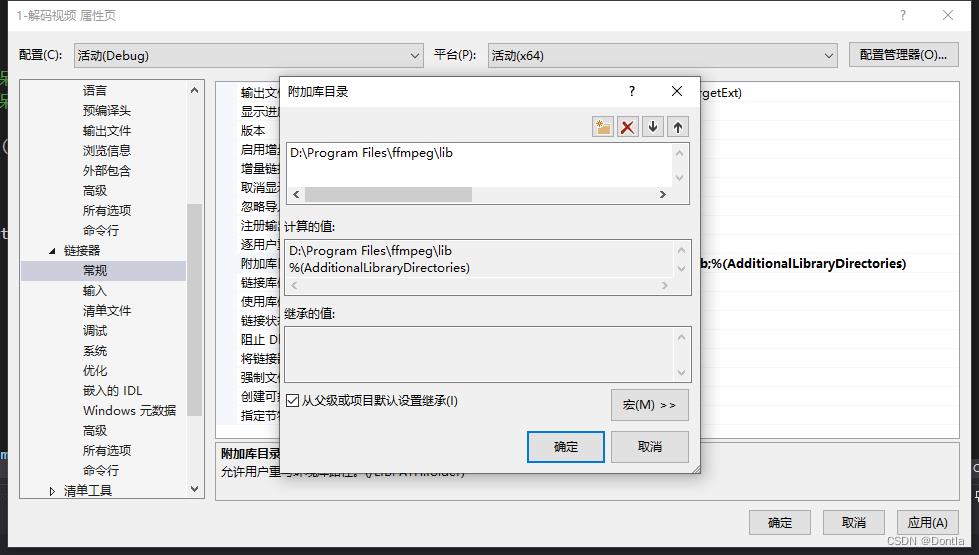
改成这样
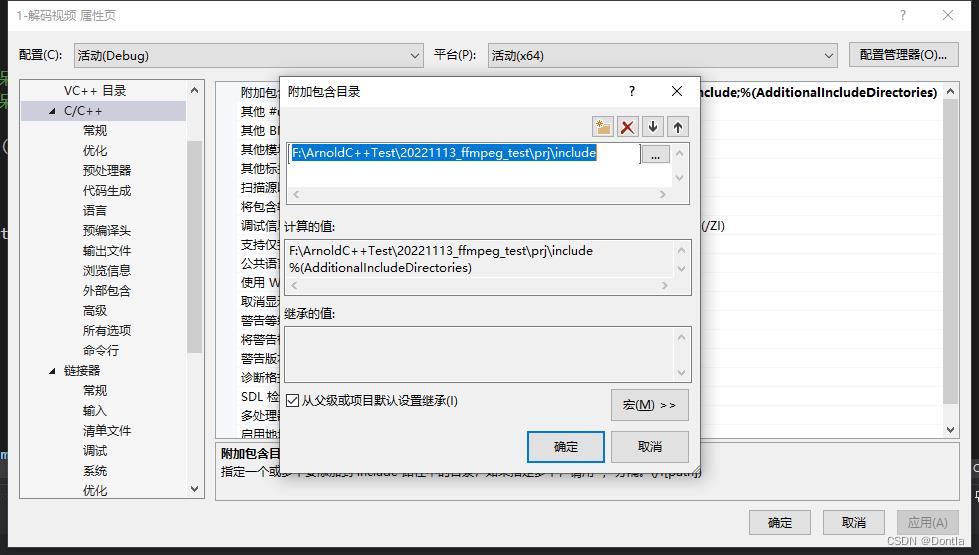
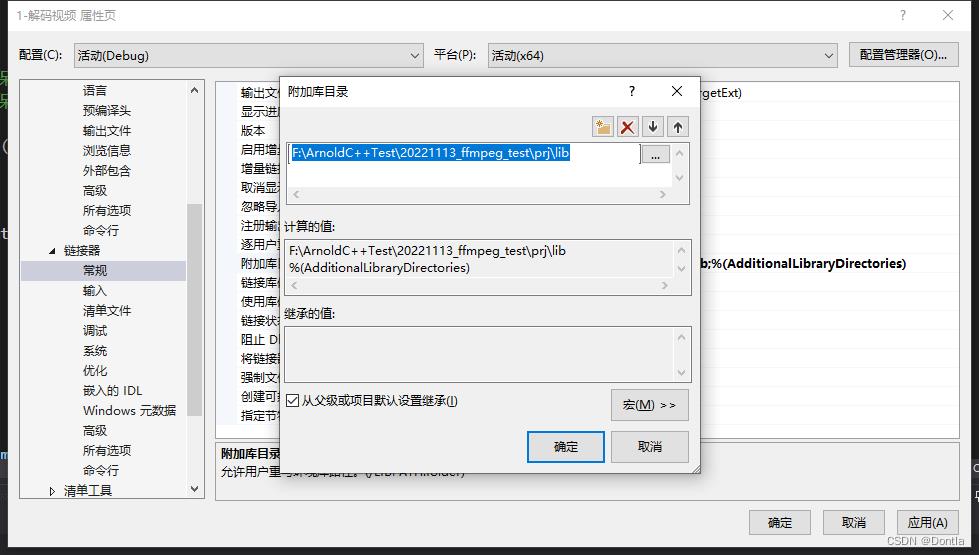
然后运行项目,发现报错了,错误 C4996 'av_init_packet': 被声明为已否决,应该这个函数不推荐使用了,我们看下4.4有没替代接口

在ffmpeg编译工程里查找,发现这个文档,参考文章:ffmpeg的API函数变化记录

看了下,貌似没替代接口,那么我们只能“沉默”它了

在代码开头添加#pragma warning(disable : 4996)
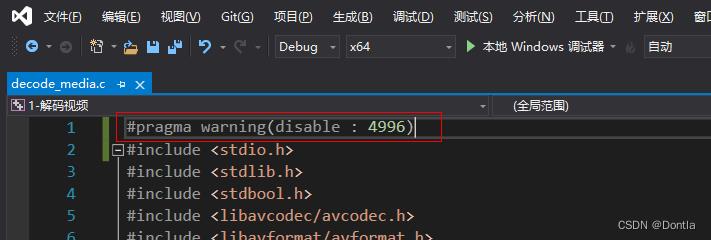
运行报错:
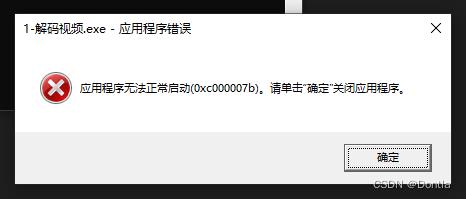
按博主提供的ffmpeg4.3配置了,也还是同样问题
严重性 代码 说明 项目 文件 行 禁止显示状态
警告 MSB8028 中间目录(x64\\Debug)包含从另一个项目(1-解码视频.vcxproj)共享的文件。
这会导致错误的清除和重新生成行为。 demux_video C:\\Program Files (x86)\\Microsoft Visual
Studio\\2019\\Community\\MSBuild\\Microsoft\\VC\\v160\\Microsoft.CppBuild.targets 513严重性 代码 说明 项目 文件 行 禁止显示状态
警告 LNK4078 找到多个“.rdata”节,它们具有不同的特性(C0400040) demux_video F:\\ArnoldCppTest\\20221113_ffmpeg_test\\prj\\libavformatd.lib(invert_limb_table.obj) 1
步入正轨
下载官方编译的ffmpeg4.3(win64-gpl-shared-4.3.zip)
遇到很多困难啊,后来发现是博主给的ffmpeg有问题,后来我到ffmpeg官网,图中箭头所指的地方下到了4.3老版本
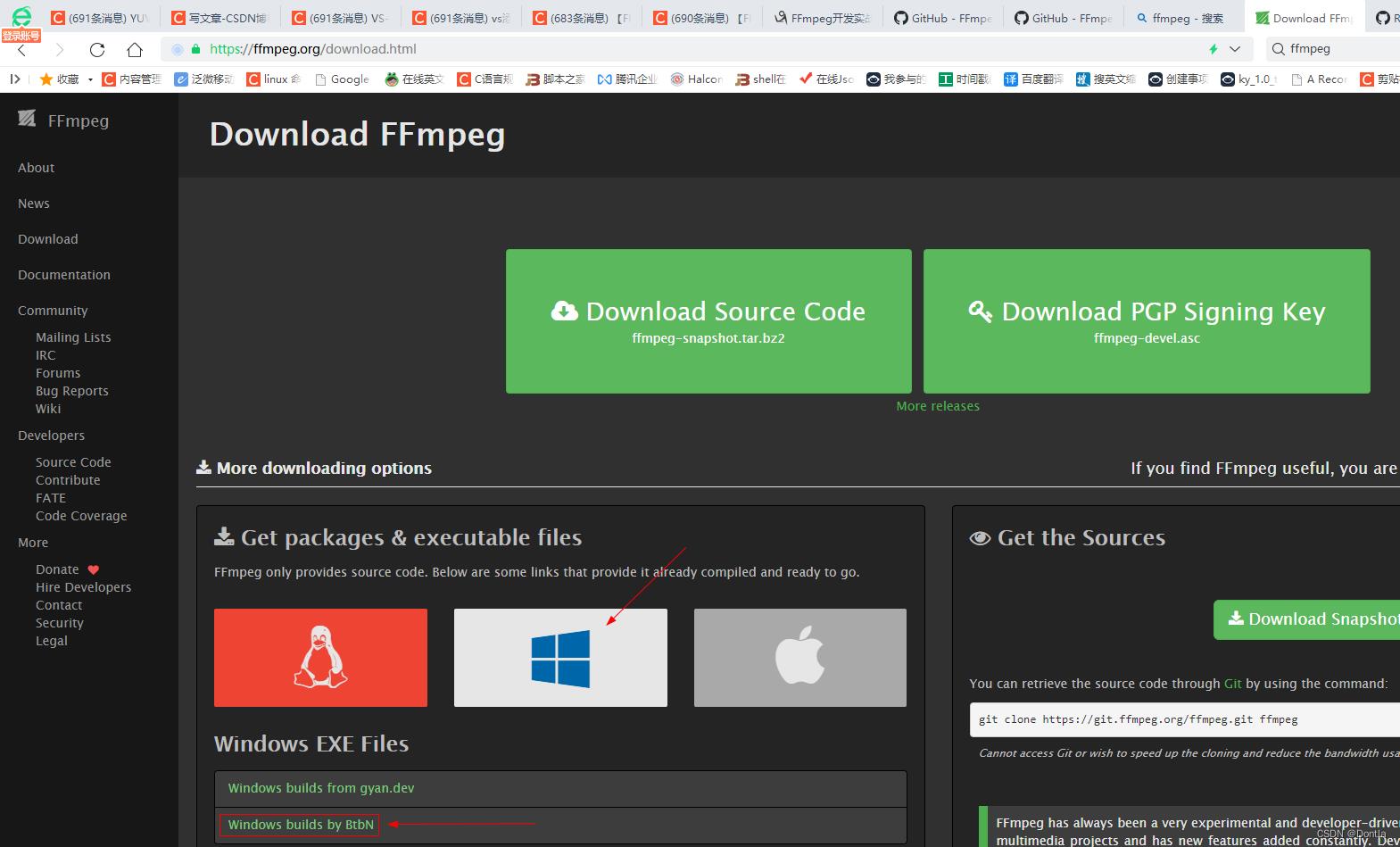
我一直往后面翻,终于找到了4.3老版本,
https://github.com/BtbN/FFmpeg-Builds/releases
然后下载了
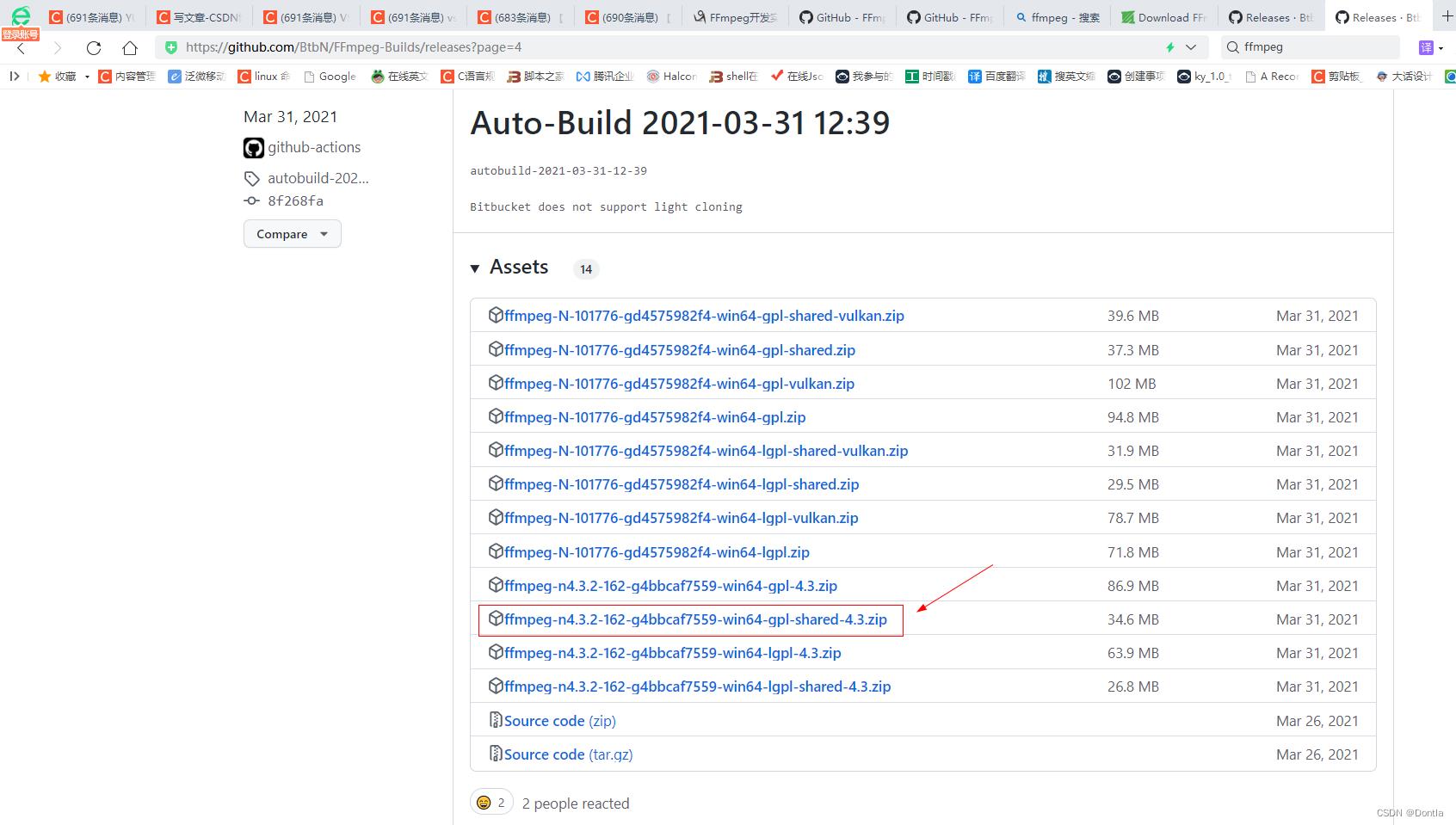
然后下下来解压,把里面的一些东西拷贝到我们项目目录中,主要就是头文件,静态库文件,动态库文件,其中动态库文件注意要放在项目根目录下
拷贝ffmpeg文件到项目
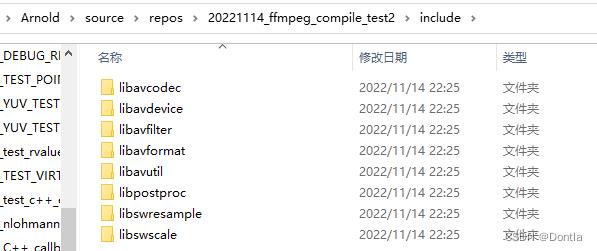
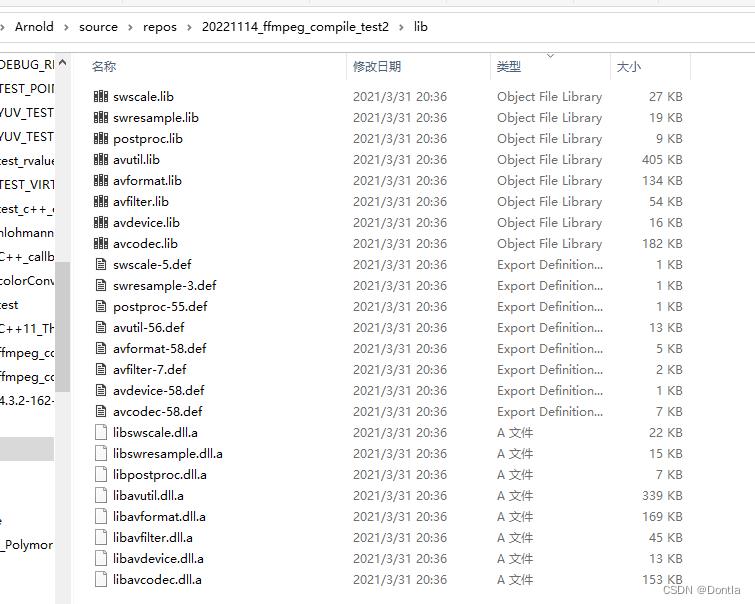
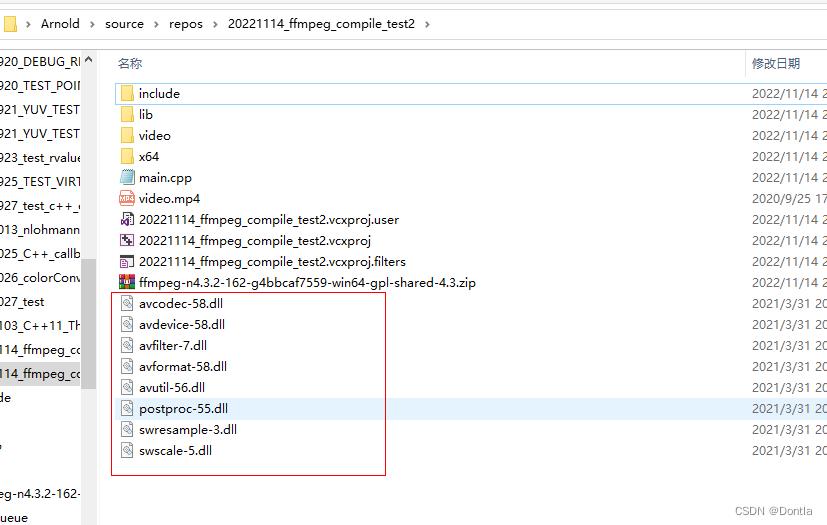
配置vs
因为下下来的没见带d,所以估计是release版本的,我们在Release x64下配置


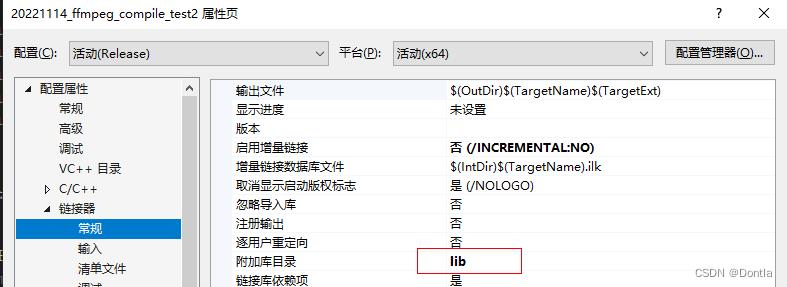
因为我们是在代码中引用附加依赖项的,所以不用在vs里填了
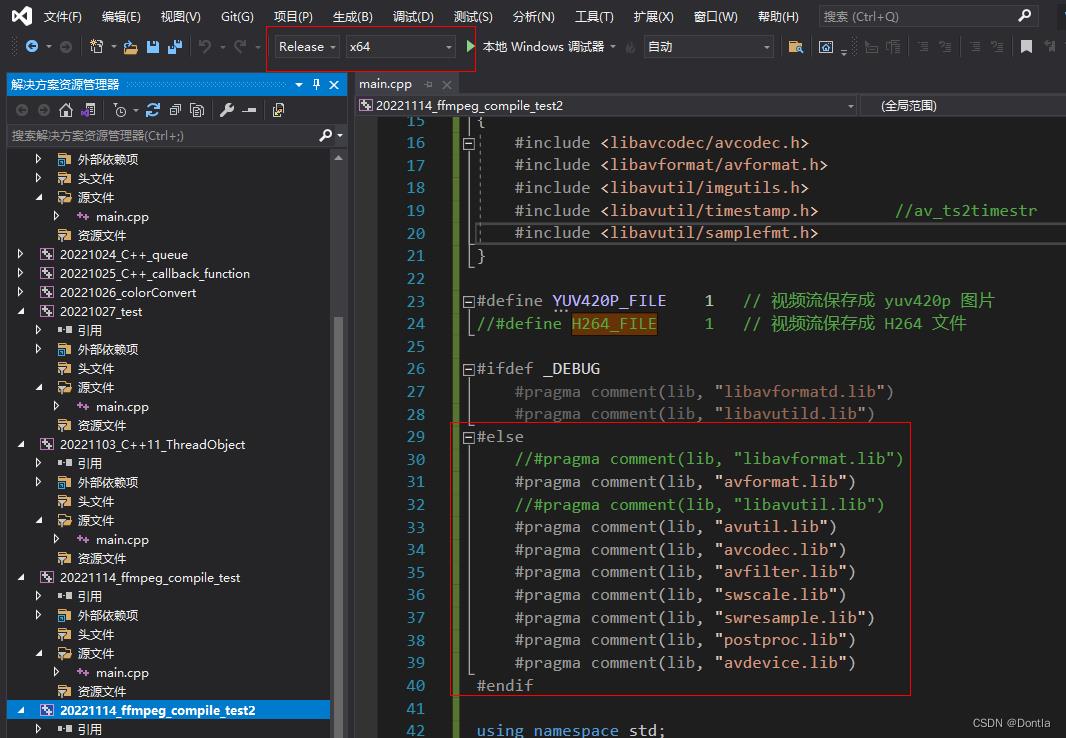
运行项目
把博主那个视频文件拷贝到项目根目录下
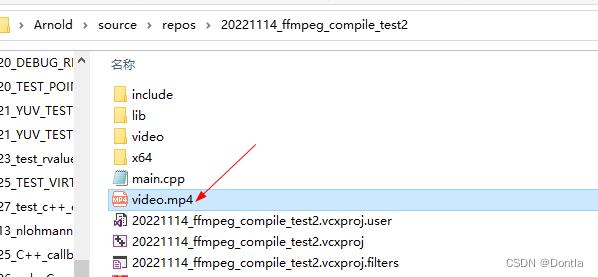
发现有的代码不大对,我们改一下,
main.cpp
/*
ffmpeg lib 测试程序
*/
#include <stdio.h>
#include <stdlib.h>
#include <stdbool.h>
#include <iostream>
#include <io.h>
#include <direct.h>
extern "C"
#include <libavcodec/avcodec.h>
#include <libavformat/avformat.h>
#include <libavutil/imgutils.h>
#include <libavutil/timestamp.h> //av_ts2timestr
#include <libavutil/samplefmt.h>
#define YUV420P_FILE 1 // 视频流保存成 yuv420p 图片
//#define H264_FILE 1 // 视频流保存成 H264 文件
#ifdef _DEBUG
#pragma comment(lib, "libavformatd.lib")
#pragma comment(lib, "libavutild.lib")
#else
//#pragma comment(lib, "libavformat.lib")
#pragma comment(lib, "avformat.lib")
//#pragma comment(lib, "libavutil.lib")
#pragma comment(lib, "avutil.lib")
#pragma comment(lib, "avcodec.lib")
#pragma comment(lib, "avfilter.lib")
#pragma comment(lib, "swscale.lib")
#pragma comment(lib, "swresample.lib")
#pragma comment(lib, "postproc.lib")
#pragma comment(lib, "avdevice.lib")
#endif
using namespace std;
static int get_format_from_sample_fmt(const char** fmt, enum AVSampleFormat sample_fmt)
int i;
struct sample_fmt_entry
enum AVSampleFormat sample_fmt;
const char* fmt_be, * fmt_le;
sample_fmt_entries[] =
AV_SAMPLE_FMT_U8, "u8", "u8" ,
AV_SAMPLE_FMT_S16, "s16be", "s16le" ,
AV_SAMPLE_FMT_S32, "s32be", "s32le" ,
AV_SAMPLE_FMT_FLT, "f32be", "f32le" ,
AV_SAMPLE_FMT_DBL, "f64be", "f64le" ,
;
*fmt = NULL;
for (i = 0; i < FF_ARRAY_ELEMS(sample_fmt_entries); i++)
struct sample_fmt_entry* entry = &sample_fmt_entries[i];
if (sample_fmt == entry->sample_fmt)
*fmt = AV_NE(entry->fmt_be, entry->fmt_le);
return 0;
fprintf(stderr,
"sample format %s is not supported as output format\\n",
av_get_sample_fmt_name(sample_fmt));
return -1;
// 参考:ffplay.c、demuxing_decoding.c
int main(int argc, char* argv[])
int ret = 0;
//printf("%s \\n",avcodec_configuration());
// 定义文件名
const char input_filename[] = "video.mp4";
const char out_filename[] = "video_out";
char video_dst_filename[50]; // = "Video_Test_out.h264";
char audio_dst_filename[50]; // = "Video_Test_out.aac";
memset(video_dst_filename, '\\0', 50);
memset(audio_dst_filename, '\\0', 50);
// 1. 打开文件,分配AVFormatContext 结构体上下文
AVFormatContext* fmt_ctx = NULL; // 定义音视频格式上下文结构体
if (avformat_open_input(&fmt_ctx, input_filename, NULL, NULL) < 0)
printf("Could not open source file %s\\n", input_filename);
return 0;
// 2. 查找文件对应的流信息
if (avformat_find_stream_info(fmt_ctx, NULL) < 0)
printf("Could not find stream information\\n");
return 0;
// 3. 打印流信息
av_dump_format(fmt_ctx, 0, input_filename, 0);
// 4. 视频解码器初始化
// 4.1 获取视频对应的stream_index
int video_stream_idx = av_find_best_stream(fmt_ctx, AVMEDIA_TYPE_VIDEO, -1, -1, NULL, 0);
printf("\\n#===> Find video_stream_idx = %d\\n", video_stream_idx);
// 4.2 获取到stream 数据
AVStream* video_st = fmt_ctx->streams[video_stream_idx];
// 4.3 根据 codec_id 查找解码器
AVCodec* video_dec = avcodec_find_decoder(video_st->codecpar->codec_id);
// 4.4 初始化解码器上下文信息
AVCodecContext* video_dec_ctx = avcodec_alloc_context3(video_dec);
// 4.5 复制 codec 相关参数到解码器上下文中
avcodec_parameters_to_context(video_dec_ctx, video_st->codecpar);
printf("\\n#===> Find decoder: %s, coded_id:%d long name: %s pix_fmt=%d (%s)\\n", video_dec->name, video_dec->id, video_dec->long_name, video_dec_ctx->pix_fmt, av_get_pix_fmt_name(video_dec_ctx->pix_fmt));
// 4.6 初始化并打开解码器
AVDictionary* video_opts = NULL;
avcodec_open2(video_dec_ctx, video_dec, &video_opts);
// 5. 音频解码器初始化
// 5.1 获取音频对应的stream_index
int audio_stream_idx = av_find_best_stream(fmt_ctx, AVMEDIA_TYPE_AUDIO, -1, -1, NULL, 0);
printf("\\n#===> Find audio_stream_idx = %d\\n", audio_stream_idx);
// 5.2 获取到stream 数据
AVStream* audio_st = fmt_ctx->streams[audio_stream_idx];
// 5.3 根据 codec_id 查找解码器
AVCodec* audio_dec = avcodec_find_decoder(audio_st->codecpar->codec_id);
printf("\\n#===> Find decoder: %s, coded_id:%d long name: %s\\n", audio_dec->name, audio_dec->id, audio_dec->long_name);
// 5.4 初始化解码器上下文信息
AVCodecContext* audio_dec_ctx = avcodec_alloc_context3(audio_dec);
// 5.5 复制 codec 相关参数到解码器上下文中
avcodec_parameters_to_context(audio_dec_ctx, audio_st->codecpar);
// 5.6 初化并打开音频解码器
AVDictionary* audio_opts = NULL;
avcodec_open2(audio_dec_ctx, audio_dec, &audio_opts);
// 6. 配置视频解复用后要保存的位置
FILE* video_dst_file = NULL, * audio_dst_file = NULL;
#ifdef H264_FILE
sprintf_s(video_dst_filename, 50, "%s.%s", out_filename, video_dec->name);
ret = fopen_s(&video_dst_file, video_dst_filename, "wb");
printf("open file:%s ret:%d\\n", video_dst_filename, ret);
#endif
#ifdef YUV420P_FILE
//文件夹名称
char folderName[] = "video";
// 文件夹不存在则创建文件夹
if (_access(folderName, 0) == -1)
_mkdir(folderName);
snprintf(audio_dst_filename, 50, "video/%s.%s", out_filename, audio_dec->name);
#else
sprintf_s(audio_dst_filename, 50, "%s.%s", out_filename, audio_dec->name);
#endif
ret = fopen_s(&audio_dst_file, audio_dst_filename, "wb");
printf("open file:%s ret:%d\\n", audio_dst_filename, ret);
uint8_t* video_dst_data[4] = NULL ;
int video_dst_linesize[4] = 0 ;
// 7. 计算视频数据大小
size_t video_dst_bufsize = av_image_alloc(video_dst_data, video_dst_linesize,
video_dec_ctx->width, video_dec_ctx->height, video_dec_ctx->pix_fmt, 1);
// 8. 分配并初始化 AVFrame、AVPacket
AVFrame* frame = av_frame_alloc();
AVPacket pkt;
av_init_packet(&pkt);
pkt.data = NULL;
pkt.size = 0;
int video_frame_count = 0, audio_frame_count = 0;
printf("Start read frame\\n");
// 9. 循环读取 一帧数据
while (av_read_frame(fmt_ctx, &pkt) >= 0)
// 10. 视频数据解码
if (pkt.stream_index == video_stream_idx)
// 10.1 将 packet 数据 发送给解码器
ret = avcodec_send_packet(video_dec_ctx, &pkt);
// 10.2 获取解码后的帧数据
while (ret >= 0)
ret = avcodec_receive_frame(video_dec_ctx, frame);
if (ret == AVERROR_EOF || ret == AVERROR(EAGAIN))
ret = 0;
break;
// 10.3 保存帧数据到视频文件中
//printf("#===> video_frame n:%d coded_n:%d ", video_frame_count++, frame->coded_picture_number);
av_image_copy(video_dst_data, video_dst_linesize,
(const uint8_t**)(frame->data), frame->linesize, video_dec_ctx->pix_fmt, video_dec_ctx->width, video_dec_ctx->height);
#ifdef YUV420P_FILE
// 10.4 写入文件
sprintf_s(video_dst_filename, 50, "video/%s.%s.%d.yuv", out_filename, av_get_pix_fmt_name(video_dec_ctx->pix_fmt), video_frame_count++);
ret = fopen_s(&video_dst_file, video_dst_filename, "wb");
//printf("open file:%s ret:%d\\n", video_dst_filename, ret);
#endif
ret = (int)fwrite(video_dst_data[0], 1, video_dst_bufsize, video_dst_file);
//printf("Write Size:%d\\n", ret);
#ifdef YUV420P_FILE
fclose(video_dst_file);
#endif
// 11. 音频数据解码
else if (pkt.stream_index == audio_stream_idx)
// 11.1 将 packet 数据 发送给解码器
ret = avcodec_send_packet(audio_dec_ctx, &pkt);
// 11.2 获取解码后的帧数据
while (ret >= 0)
ret = avcodec_receive_frame(audio_dec_ctx, frame);
if (ret == AVERROR_EOF || ret == AVERROR(EAGAIN))
ret = 0;
break;
// 11.3 写入文件
//printf("#===> audio_frame n:%d nb_samples:%d pts:%s ",
// audio_frame_count++, frame->nb_samples, av_ts2timestr(frame->pts, &audio_dec_ctx->time_base));
ret = (int)fwrite(frame->extended_data[0], 1, frame->nb_samples * av_get_bytes_per_sample((AVSampleFormat)(frame->format)), audio_dst_file);
//printf("Write Size:%d\\n", ret);
av_frame_unref(frame);
// 清空AVPacket结构体数据
av_packet_unref(&pkt);
if (ret < 0)
break;
// 12.发送一个空包,刷新解码器
ret = avcodec_send_packet(video_dec_ctx, NULL);
// 12.1 获取解码后的帧数据
while (ret >= 0)
ret = avcodec_receive_frame(video_dec_ctx, frame);
if (ret == AVERROR_EOF || ret == AVERROR(EAGAIN))
printf("break, video ret=%d \\n", ret);
ret = 0;
break;
ret = avcodec_send_packet(audio_dec_ctx, NULL);
// 12.2 获取解码后的帧数据
while (ret >= 0)
ret = avcodec_receive_frame(audio_dec_ctx, frame);
if (ret == AVERROR_EOF || ret == AVERROR(EAGAIN))
printf("break, audio ret=%d \\n", ret);
ret = 0;
break;
// 13. 解复用完毕
printf("Demuxing succeeded.\\n");
printf("Play the output video file with the command:\\n"
"ffplay -f rawvideo -pix_fmt %s -video_size %dx%d %s\\n",
av_get_pix_fmt_name(video_dec_ctx->pix_fmt), video_dec_ctx->width, video_dec_ctx->height, video_dst_filename);
FILE* bat_dst_file = NULL;
char bat_out[100] = "";
memset(bat_out, '\\0', 100);
#ifdef YUV420P_FILE
memset(video_dst_filename, '\\0', 50);
sprintf_s(video_dst_filename, 50, "%s.%s.%d.yuv", out_filename, av_get_pix_fmt_name(video_dec_ctx->pix_fmt), 0);
#endif
sprintf_s(bat_out, 99, "ffplay -f rawvideo -pix_fmt %s -video_size %dx%d %s",
av_get_pix_fmt_name(video_dec_ctx->pix_fmt), video_dec_ctx->width, video_dec_ctx->height, video_dst_filename);
#ifdef YUV420P_FILE
ret = fopen_s(&bat_dst_file, "video/play_video.bat", "wb");
#else
ret ffmpeg视频编解码 demo初探(包含下载指定windows版本ffmpeg)将YUV图片序列作为流读入,编码封装成x264 MP4视频
ffmpeg视频编解码 demo初探(包含下载指定windows版本ffmpeg)将YUV图片序列作为流读入,编码封装成x264 MP4视频